Unit 2 Can you swim 单元整体教学设计(3课时)
文档属性
| 名称 | Unit 2 Can you swim 单元整体教学设计(3课时) |
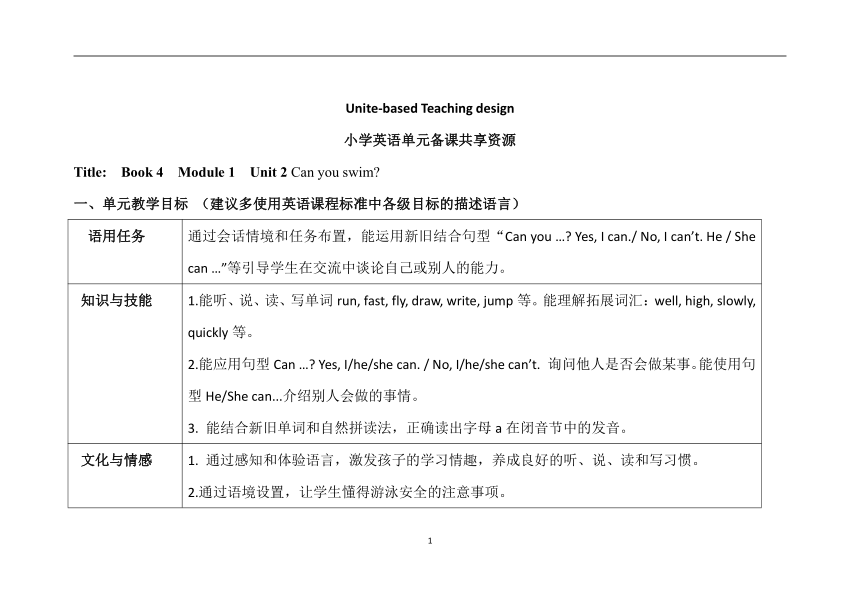
|
|
| 格式 | zip | ||
| 文件大小 | 536.9KB | ||
| 资源类型 | 教案 | ||
| 版本资源 | 牛津深圳版 | ||
| 科目 | 英语 | ||
| 更新时间 | 2018-08-16 00:00:00 | ||
图片预览

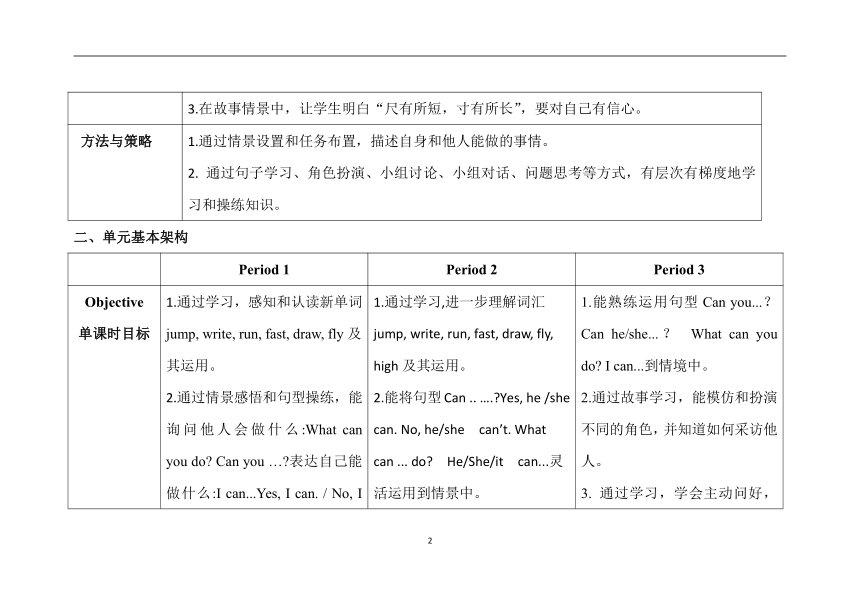
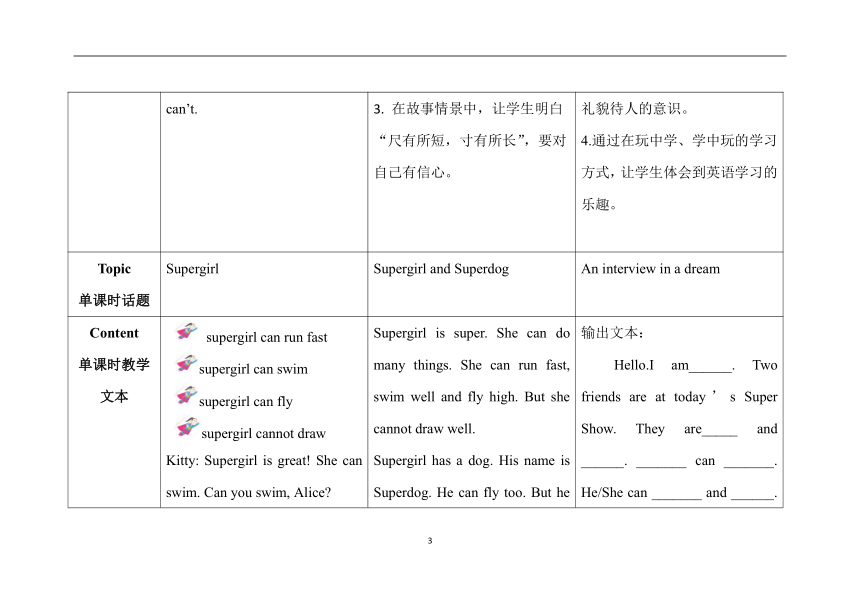
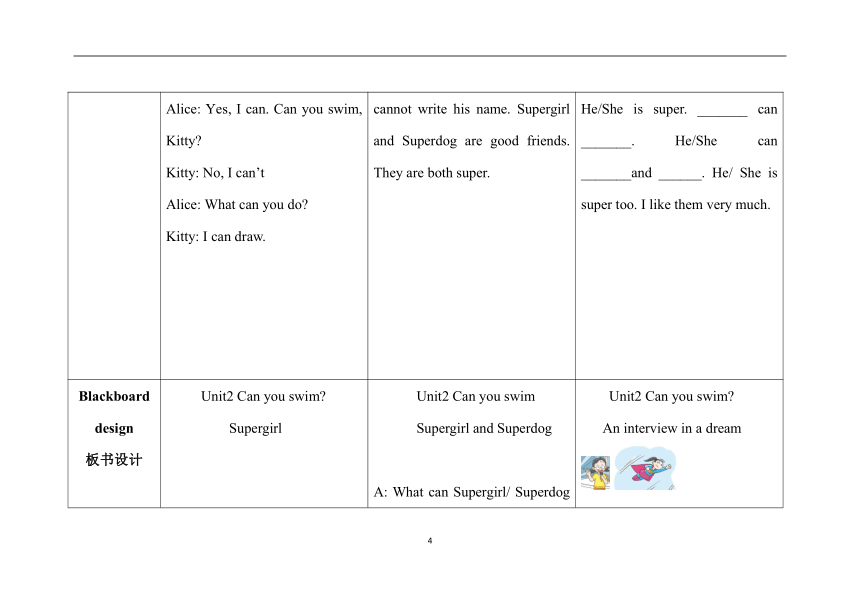
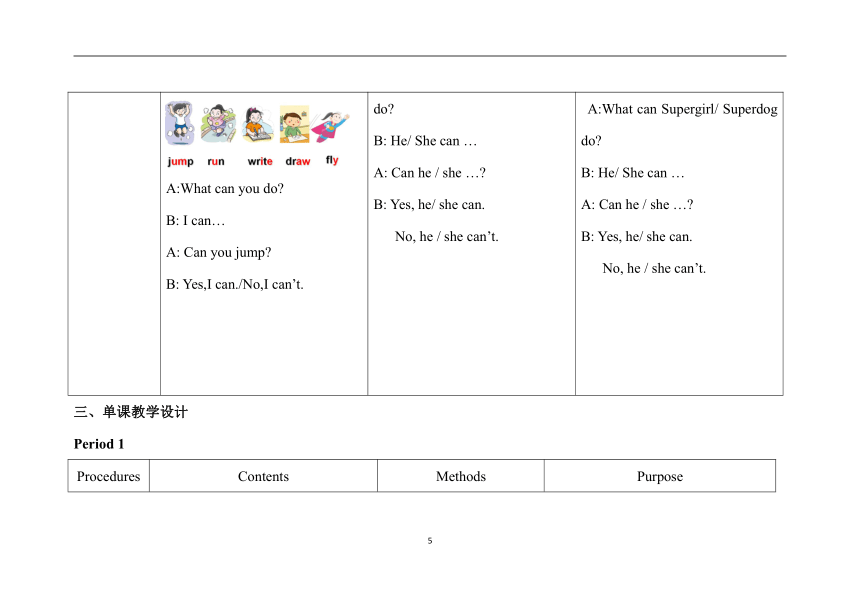
文档简介
Unite-based Teaching design
小学英语单元备课共享资源
Title: Book 4 Module 1 Unit 2 Can you swim?
一、单元教学目标 (建议多使用英语课程标准中各级目标的描述语言)
语用任务
通过会话情境和任务布置,能运用新旧结合句型“Can you …? Yes, I can./ No, I can’t. He / She can …”等引导学生在交流中谈论自己或别人的能力。
知识与技能
1.能听、说、读、写单词run, fast, fly, draw, write, jump等。能理解拓展词汇:well, high, slowly, quickly等。
2.能应用句型Can …? Yes, I/he/she can. / No, I/he/she can’t. 询问他人是否会做某事。能使用句型He/She can...介绍别人会做的事情。
3. 能结合新旧单词和自然拼读法,正确读出字母a在闭音节中的发音。
文化与情感
1. 通过感知和体验语言,激发孩子的学习情趣,养成良好的听、说、读和写习惯。
2.通过语境设置,让学生懂得游泳安全的注意事项。
3.在故事情景中,让学生明白“尺有所短,寸有所长”,要对自己有信心。
方法与策略
1.通过情景设置和任务布置,描述自身和他人能做的事情。
2. 通过句子学习、角色扮演、小组讨论、小组对话、问题思考等方式,有层次有梯度地学习和操练知识。
二、单元基本架构
Period 1
Period 2
Period 3
Objective
单课时目标
1.通过学习,感知和认读新单词jump, write, run, fast, draw, fly及其运用。
2.通过情景感悟和句型操练,能询问他人会做什么:What can you do? Can you …?表达自己能做什么:I can...Yes, I can. / No, I can’t.
1.通过学习,进一步理解词汇jump, write, run, fast, draw, fly, high及其运用。
2.能将句型Can .. ….?Yes, he /she can. No, he/she can’t. What can ... do? He/She/it can...灵活运用到情景中。
3. 在故事情景中,让学生明白“尺有所短,寸有所长”,要对自己有信心。
1.能熟练运用句型Can you...? Can he/she...? What can you do? I can...到情境中。
2.通过故事学习,能模仿和扮演不同的角色,并知道如何采访他人。
3. 通过学习,学会主动问好,礼貌待人的意识。
4.通过在玩中学、学中玩的学习方式,让学生体会到英语学习的乐趣。
Topic
单课时话题
Supergirl
Supergirl and Superdog
An interview in a dream
Content
单课时教学文本
supergirl can run fast
supergirl can swim
supergirl can fly
supergirl cannot draw
Kitty: Supergirl is great! She can swim. Can you swim, Alice?
Alice: Yes, I can. Can you swim, Kitty?
Kitty: No, I can’t
Alice: What can you do?
Kitty: I can draw.
Supergirl is super. She can do many things. She can run fast, swim well and fly high. But she cannot draw well.
Supergirl has a dog. His name is Superdog. He can fly too. But he cannot write his name. Supergirl and Superdog are good friends. They are both super.
输出文本:
Hello.I am______. Two friends are at today’s Super Show. They are_____ and ______. _______ can _______. He/She can _______ and ______. He/She is super. _______ can _______. He/She can _______and ______. He/ She is super too. I like them very much.
Blackboard design
板书设计
Unit2 Can you swim?
Supergirl
A:What can you do?
B: I can…
A: Can you jump?
B: Yes,I can./No,I can’t.
Unit2 Can you swim
Supergirl and Superdog
A: What can Supergirl/ Superdog do?
B: He/ She can …
A: Can he / she …?
B: Yes, he/ she can.
No, he / she can’t.
Unit2 Can you swim?
An interview in a dream
A:What can Supergirl/ Superdog do?
B: He/ She can …
A: Can he / she …?
B: Yes, he/ she can.
No, he / she can’t.
三、单课教学设计
Period 1
Procedures
Contents
Methods
Purpose
Pre-lesson
Greeting
Phonics: 听一遍learn the sounds部分的语音视频,找出chant中含有“a”发音的单词
学生认真观看视频,并通过教师的引导,找出发音单词
初步感知字母“a”发音
Pre-task preparation
1.播放歌曲Yes, I can.与孩子一起边唱边跳。
2. Free talk: 教师询问学生
T:What can you do?
S: I can…
T:Can you…?
S: Yes,I can./ No,I can’t. I can…
学生认真听和跟唱歌曲Yes, I can.并舞动。
学生与教师互动。大声说英语,与老师交流。
运用歌曲激发学生学习兴趣,活跃课堂气氛
通过复习旧知What can you do?I can…过渡到Can you? Yes, I can.. No, I can’t. 以旧带新,为新知做铺垫
While-task procedure
1.T: Can you run fast?
Can you draw well?
Can you write quickly?
Can you fly?
But there is a supergirl. She can fly.
2.watch and answer
T: Now let’s watch a video of supergirl and see what can supergirl do.
教师给学生播放关于Supergirl超能力的视频对话,帮助孩子学会归纳。帮助学生用肢体语言感知副词。
T: What can supergirl do ?
S:She can run fast, swim and fly
3.Listen and answer
播放关于Supergirl超能力的录音对话
T: What can’t supergirl do?
S: She can’t draw同时点出can’t=cannot
4. listen and answer
从supergirl 过渡到kitty. 播放kitty与Alice的对话,让学生回答 what can/can’t kitty do?
5.Look and say
让学生跟读录音,分组齐读以及男女交替读对话,再同桌操练kitty 与Alice的对话,分角色朗读,并选取若干组上台表演。
6.Say and act
给出句型框架,让学生根据实际情况与同桌互问What can you do? I can..
Can you…? Yes/ No….
当学生回答I can swim的时候,教育学生关于游泳的注意事项,提醒学生夏天游泳要注意安全
1.学生回答老师的问题。与教师互动做动作,感知副词
S1: I can…
S2:Yes,I can.
S2:No,I can’t. I can…
2.通过观看视频, 学生能初步运用句型
S: She can run fast.
She can swim
She can fly.
3. 学生认真听关于Supergirl超能力的音频,回答老师提出的问题。能初步运用句型 She can’t draw.
4.学生认真听kitty与Alice的对话,回答老师的问题
S: She can draw.
She can’t swim
5. 学生根据老师的指令朗读文本。同桌之间进行pair work,根据老师的指令表演朗读文本。学生分角色表演会话。
6. 学生同桌互问,
S:What can you do?
S:I can..
S:Can you…?
S:Yes/ No….
学生受到启发,游泳时注意安全
通过肢体语言初步感知词汇run, fast, fly, draw, fast, well, quickly,slowly,并引出话题人物Supergirl.
带领学生在情境中能运用句型What can supergirl do ? She can..并学习新词jump, write, run, fast,与fly
带领学生在情境中能运用句型What cann’t supergirl do? She can’t… 并学习新词draw
巩固句型 what can/can’t …do?让学生能够灵活使用,并且可以根据不同的问题回答…can/can’t…
通过反复操练以及表演表演,让学生熟练使用what can you do? I can…Can you…?
通过小组活动,让学生能够灵活运用句型
What can you do? I can…Can you…?
Post-task activity
Ask and answer: Supergirl are super, how about you. Now let’s do a survey. Please ask your classmates.
What can you do?
Can you jump high? /run fast? / write well?
给出表格,
Name
jump
run
swim
Betty
学生合作完成调查。
S1:What can you do?
Can you..?
S2:Can you..?
S3 do the survey.
让学生通过小组合作一起完成问卷调查,让学生在真实的语境中巩固句型What can you do? Can you..?并培养孩子的合作能力,提升英语交际能力
Assignment
1. 听录音,有感情地模仿Say and Act部分对话。
2. 向爸爸妈妈介绍自己或好朋友的能力, 同时询问他们的能力
Hello. I am…I can… I can…Can you…?
Period 2
Procedures
Contents
Methods
Purpose
Pre-lesson
播放can - can’t的儿歌,让学生跟唱。
Phonics. 播放Learn the sound 视频,让学生跟读。然后让学生找出其他含有相同发音的单词。如:fat, apple, bag等。
学生跟唱儿歌Yes, I can。
学生跟读视频,思考并说说还有哪些单词发/a/音。
用吟唱歌曲来活跃课堂气氛,为话题引入做铺垫。
培养学生的发散性思维能力,让语音学习更扎实。
Pre-task preparation
1.Revision.复习Listen and say内容。
2. Lead in. Supergirl has a dog, his name’s Superdog. They are both super. Let’s learn their stories.
1.学生根据教师提供的Listen and say 图片,复述课文内容。
2. 学生猜测Superdog 会做什么?
S:Can he …?
T: Yes, he can. / No, he can’t.
复习旧知,为新知的导入做铺垫。
学生猜Superdog会做什么,他们会比较感兴趣,同时引出本课的主要句型Can he …? Yes, he can. / No, he can’t.
While-task procedure
1.Look and read the passage. Supergirl and Superdog
2.Pairwork.让学生讨论Supergirl 和Superdog能做什么、不能做什么。
3.Read and give a title.
4.Read and complete.
Supergirl and Superdog
Supergirl is ________. She can do many things. She can ______ fast, _______ well and _______ high. But she _______ _______ well.
Supergirl has a dog. ______ name is Superdog. He can fly too. But he cannot ______ his name. Supergirl and Superdog are good friends. They are both super.
1. 学生齐读文章Supergirl and Superdog.
2.学生两人一组讨论。
A: What can Supergirl / Superdog do?
B: He/ She can ______.
A: Can he /she ______?
B: Yes, he / she can.
No, he /she can’t.
3.让学生默读这篇文章,并给这篇文章取一个恰当的名字。
4.学生自行思考一分钟,然后个别学生回答,出示答案,最后再让学生自行读一遍短文。
1.让学生对Supergirl 和Superdog有初步的、整体的感知。
2.让学生在真实的情境中,练习、运用和掌握新句型,同时提高学生的交流、合作意识。
考查学生对文章的理解和概括能力,提高学生的阅读能力。
检查学生是否真正掌握文章内容,同时看学生能否灵活运用所学的知识。
Post-task activity
1.Do a survey. 调查Superdog的动物朋友们会做什么。
2.Moral education. 展示动物的图片,让学生明白“尺有所短,寸有所长”,每个人都有自己的长处和短处,要相信自己也是最棒的。
cat
fish
mouse
elephant
bird
rabbit
run
jump
swim
fly
1.学生两人一组,调查动物能做什么。
A: What can a / an … do?
B: It can …
It can’t …
2.学生看Supergirl, Superdog以及动物图片,说
He/She /It can / can’t …,读一句英语谚语Everyone has his strong and weak points.(尺有所短,寸有所长)
1.学生在事实的情境中进行口语交流,复习巩固本节课所学的知识,同时拓展学生的知识面,提高学生的口语交际能力。
2.让学生在故事情境中,明白每个人都有自己的长处和短处,要对自己有信心,相信自己是最棒的。
Assignment
1.Read the passage Supergirl and Superdog two times for your parents.
2.Make a mind-map of your favourite animals ,show their abilities.
Period 3
Procedures
Contents
Methods
Purpose
Pre-lesson
1.复习can - can’t的儿歌,让学生跟唱。
2.Phonics. 出示符合发音规则的单词,如hat bag mat cat fan apple让学生朗读。
老师根据新的单词bag,根据书上的内容编写了一个新的儿歌让学生跟读,然后要求学生根据单词编写自己喜欢的儿歌。
1.通过问答的方式,检测学生上节课的旧知。
2.老师示范了一次怎么编写儿歌,然后让学生通过发散思维去编写自己喜欢的儿歌。学生可以自己完成也可以小组讨论完成。
1.通过问答,激活学生的旧知,为下个环节做铺垫
2.培养学生的发散性思维能力,让语音学习更扎实。
Pre-task preparation
1.Revision.复习Listen and say中新文本的内容。
2. watch and answer.
Kitty likes Supergirl very much. She thinks about Supergirl all the time (一直). Now she is asleep (睡着的).
1.学生用自己的话去复述课文内容。
2. 学生通过听录音,找出文中的关键信息?
S:In Kitty’s dream, what is she?
Who is in her dream?
1.复习旧知,为新知的导入做铺垫。
2.学生猜Kitty的梦中都有谁,会做什么,他们会比较感兴趣,同时引出本课的主要句型Can he …? Yes, he can. / No, he can’t.
While-task procedure
1.Look and read the passage. Supergirl and Superdog
2.Pairwork.让学生讨论后回答Supergirl 和Superdog能做什么、不能做什么。
3.Kitty is happy today. She is having a dream. In her dream, she is on TV. She is the host of Super Show. She is interviewing Supergirl. 通过阅读短文后让学生给这篇文章取个标题。
4.Read and complete.
An interview in a dream.
Kitty: Good evening. I’m Kitty.
Welcome to Super Show.
Here are our friends — Supergirl and Superdog.
What can you do, Supergirl?
Supergirl: I can swim and fly.
Kitty: Can Superdog fly too?
Superdog: Woof!
Supergirl: Yes, he can, but he can’t write his name.
Kitty: Thank you, Supergirl and Superdog! You are both super.
Supergirl: Thank you!
1. 学生齐读文章An interview in a dream.
2.学生两人一组讨论。
A: What can Supergirl / Superdog do?
B: He/ She can ______.
A: Can he /she ______?
B: Yes, he / she can.
No, he /she can’t.
3.让学生默读这篇文章,并给这篇文章取一个恰当的名字。
4.学生自行思考一分钟,然后个别学生回答,出示答案,最后再让学生自行读一遍短文。
1.让学生对这个特殊的采访有初步的、整体的感知。
2.让学生在真实的情境中,练习、运用和掌握新句型,同时提高学生的交流、合作意识。
3.考查学生对文章的理解和概括能力,提高学生的阅读能力。
4.检查学生是否真正掌握文章内容,同时看学生能否灵活运用所学的知识。
Post-task activity
1.通过听录音,让学生能够朗读并理解文本的意思。
2. 根据文本意思填空。
Kitty: Good evening. I’m ______ .
Welcome to __________.
Here are our ________ — Supergirl and ________ .
What can you do, Supergirl?
Supergirl: I can ______ and ______ .
Kitty: Can Superdog ______ too?
Superdog: Woof!
Supergirl: Yes, he can, but he can’t _____ his name.
Kitty: Thank you, _________ ! You are both super.
Supergirl: Thank you!
3.Role play
4.Make a report.
1.让学生熟练朗读文本。
2.让学生在理解了文本的前提下填空。
3.角色扮演。
教师先进行示范,让学生清楚本文本的主要人物,然后让学生分组表演,最后再进行展示。
4. Make a report.
Hello, everyone.
My name’s …
I’m the host of Super Show.
… and … are our friends.
… can …
… can … too.
They are super.
I like them very much.
1. 填空的练习能很好地检学生理解的程度,是对学困生以及中等程度同学知识的一种巩固。
2.学在有趣的表演中复习本节课知识,同时拓展学生的知识面,提高学生的口语交际能力。
3.自己当主持人做报告这个环节是对学优生知识的一种拓展,让她们用自己的话把这个文本复苏出来,有利于提高她们学习的兴趣。
Assignment
1.Read the passage An interview in a dream two times for your parents.
2.Make new report.
四、阅读素养评价
A 读一读,圈出正确的答案。
Hi, My name is Kitty. I’m 9. I like dancing very much and I can draw very well. This Sunday my mother will go to swim, but I can’t swim. I have a sister, her name is Jill. She is 10. She can swim. She can run very fast.
1. Kitty/ Jill is nine years old.
2. Kitty/ Jill can’t swim.
3. Kitty can dance/ draw very well.
4. Kitty/ Jill can run very fast.
B 读一读,选出正确的答案。
A fly can walk (行走)up a wall. It can walk upside down (倒转;翻转)too. But how does the fly do that?
A fly has six legs. Each (每一个)leg has a little sticky pad(粘性的趾)on it. It is almost(几乎) like (像)a shoe. The pads stick to (黏在)the wall. So a fly can walk up a wall and it doesn’t fall(掉下).
( )1. We can’t walk up a wall, but a _____ can.
( )2. A fly has _____ legs.
6 b. 5 c. 4 d. 3
( )3. How many sticky pads does a fly have?
3 b. 4 c. 5 d. 6
C根据短文内容,判断正(T)误(F)
This is my new friend. Her name is Supercat. She is super. She can run. She can swim. She can play football too. Every Sunday she and her friend Superdog play football. Supercat likes fish very much. She is always (总是) happy.
Supercat can run. ( )
Supercat cannot swim. ( )
Supercat and Superdog are friends. ( )
Supercat likes meat. ( )
Supercat is always sad. ( )
D根据短文内容,判断正(T)误(F)
Mike and Tom are in the same school. They are in the same grade, too. Mike has English classes in the morning, but Tom has English classes in the afternoon. After school, they play games. They often play basketball, play football, fly kites and ride bikes. They can jump, swim and sing, too. They are good students. They love their school.
( ) 1. Mike and Tom are in the same school.
( ) 2. They have English classes in the morning.
( ) 3. They are in the same class.
( ) 4. They often swim after school.
( ) 5. They are not good students.
参考答案:
A 1. Kitty 2. Kitty 3.draw 4.Jill
B 1. c 2. a 3. d
C 1.T 2.F 3.T 4.F 5.F
D 1.T 2.F 3.F 4.F 5.F
设计要求:
1. 建议选取的阅读内容与单元主题、单课时话题相关,根据学生的特点,为不同层次的学生选择不同的阅读材料,鼓励选取故事、对话、诗歌等不同形式的阅读材料,避免因为阅读材料太难而降低学生学习英语的兴趣;
2. 建议老师参考国外原版阅读材料、绘本等资源,语篇语言尽可能地道;
3. 在提供阅读体验的同时注重阅读习惯的培养,建议老师对阅读能力的考查设计不同类型的题型,对阅读理解类型提供做题方法和技巧的指导。
五、推荐阅读
1. 老师给孩子们推荐与主题相关的阅读材料或者影视剧作品等;
2. 孩子可以根据自己的选择在课外阅读或观赏,不做硬性要求。
小学英语单元备课共享资源
Title: Book 4 Module 1 Unit 2 Can you swim?
一、单元教学目标 (建议多使用英语课程标准中各级目标的描述语言)
语用任务
通过会话情境和任务布置,能运用新旧结合句型“Can you …? Yes, I can./ No, I can’t. He / She can …”等引导学生在交流中谈论自己或别人的能力。
知识与技能
1.能听、说、读、写单词run, fast, fly, draw, write, jump等。能理解拓展词汇:well, high, slowly, quickly等。
2.能应用句型Can …? Yes, I/he/she can. / No, I/he/she can’t. 询问他人是否会做某事。能使用句型He/She can...介绍别人会做的事情。
3. 能结合新旧单词和自然拼读法,正确读出字母a在闭音节中的发音。
文化与情感
1. 通过感知和体验语言,激发孩子的学习情趣,养成良好的听、说、读和写习惯。
2.通过语境设置,让学生懂得游泳安全的注意事项。
3.在故事情景中,让学生明白“尺有所短,寸有所长”,要对自己有信心。
方法与策略
1.通过情景设置和任务布置,描述自身和他人能做的事情。
2. 通过句子学习、角色扮演、小组讨论、小组对话、问题思考等方式,有层次有梯度地学习和操练知识。
二、单元基本架构
Period 1
Period 2
Period 3
Objective
单课时目标
1.通过学习,感知和认读新单词jump, write, run, fast, draw, fly及其运用。
2.通过情景感悟和句型操练,能询问他人会做什么:What can you do? Can you …?表达自己能做什么:I can...Yes, I can. / No, I can’t.
1.通过学习,进一步理解词汇jump, write, run, fast, draw, fly, high及其运用。
2.能将句型Can .. ….?Yes, he /she can. No, he/she can’t. What can ... do? He/She/it can...灵活运用到情景中。
3. 在故事情景中,让学生明白“尺有所短,寸有所长”,要对自己有信心。
1.能熟练运用句型Can you...? Can he/she...? What can you do? I can...到情境中。
2.通过故事学习,能模仿和扮演不同的角色,并知道如何采访他人。
3. 通过学习,学会主动问好,礼貌待人的意识。
4.通过在玩中学、学中玩的学习方式,让学生体会到英语学习的乐趣。
Topic
单课时话题
Supergirl
Supergirl and Superdog
An interview in a dream
Content
单课时教学文本
supergirl can run fast
supergirl can swim
supergirl can fly
supergirl cannot draw
Kitty: Supergirl is great! She can swim. Can you swim, Alice?
Alice: Yes, I can. Can you swim, Kitty?
Kitty: No, I can’t
Alice: What can you do?
Kitty: I can draw.
Supergirl is super. She can do many things. She can run fast, swim well and fly high. But she cannot draw well.
Supergirl has a dog. His name is Superdog. He can fly too. But he cannot write his name. Supergirl and Superdog are good friends. They are both super.
输出文本:
Hello.I am______. Two friends are at today’s Super Show. They are_____ and ______. _______ can _______. He/She can _______ and ______. He/She is super. _______ can _______. He/She can _______and ______. He/ She is super too. I like them very much.
Blackboard design
板书设计
Unit2 Can you swim?
Supergirl
A:What can you do?
B: I can…
A: Can you jump?
B: Yes,I can./No,I can’t.
Unit2 Can you swim
Supergirl and Superdog
A: What can Supergirl/ Superdog do?
B: He/ She can …
A: Can he / she …?
B: Yes, he/ she can.
No, he / she can’t.
Unit2 Can you swim?
An interview in a dream
A:What can Supergirl/ Superdog do?
B: He/ She can …
A: Can he / she …?
B: Yes, he/ she can.
No, he / she can’t.
三、单课教学设计
Period 1
Procedures
Contents
Methods
Purpose
Pre-lesson
Greeting
Phonics: 听一遍learn the sounds部分的语音视频,找出chant中含有“a”发音的单词
学生认真观看视频,并通过教师的引导,找出发音单词
初步感知字母“a”发音
Pre-task preparation
1.播放歌曲Yes, I can.与孩子一起边唱边跳。
2. Free talk: 教师询问学生
T:What can you do?
S: I can…
T:Can you…?
S: Yes,I can./ No,I can’t. I can…
学生认真听和跟唱歌曲Yes, I can.并舞动。
学生与教师互动。大声说英语,与老师交流。
运用歌曲激发学生学习兴趣,活跃课堂气氛
通过复习旧知What can you do?I can…过渡到Can you? Yes, I can.. No, I can’t. 以旧带新,为新知做铺垫
While-task procedure
1.T: Can you run fast?
Can you draw well?
Can you write quickly?
Can you fly?
But there is a supergirl. She can fly.
2.watch and answer
T: Now let’s watch a video of supergirl and see what can supergirl do.
教师给学生播放关于Supergirl超能力的视频对话,帮助孩子学会归纳。帮助学生用肢体语言感知副词。
T: What can supergirl do ?
S:She can run fast, swim and fly
3.Listen and answer
播放关于Supergirl超能力的录音对话
T: What can’t supergirl do?
S: She can’t draw同时点出can’t=cannot
4. listen and answer
从supergirl 过渡到kitty. 播放kitty与Alice的对话,让学生回答 what can/can’t kitty do?
5.Look and say
让学生跟读录音,分组齐读以及男女交替读对话,再同桌操练kitty 与Alice的对话,分角色朗读,并选取若干组上台表演。
6.Say and act
给出句型框架,让学生根据实际情况与同桌互问What can you do? I can..
Can you…? Yes/ No….
当学生回答I can swim的时候,教育学生关于游泳的注意事项,提醒学生夏天游泳要注意安全
1.学生回答老师的问题。与教师互动做动作,感知副词
S1: I can…
S2:Yes,I can.
S2:No,I can’t. I can…
2.通过观看视频, 学生能初步运用句型
S: She can run fast.
She can swim
She can fly.
3. 学生认真听关于Supergirl超能力的音频,回答老师提出的问题。能初步运用句型 She can’t draw.
4.学生认真听kitty与Alice的对话,回答老师的问题
S: She can draw.
She can’t swim
5. 学生根据老师的指令朗读文本。同桌之间进行pair work,根据老师的指令表演朗读文本。学生分角色表演会话。
6. 学生同桌互问,
S:What can you do?
S:I can..
S:Can you…?
S:Yes/ No….
学生受到启发,游泳时注意安全
通过肢体语言初步感知词汇run, fast, fly, draw, fast, well, quickly,slowly,并引出话题人物Supergirl.
带领学生在情境中能运用句型What can supergirl do ? She can..并学习新词jump, write, run, fast,与fly
带领学生在情境中能运用句型What cann’t supergirl do? She can’t… 并学习新词draw
巩固句型 what can/can’t …do?让学生能够灵活使用,并且可以根据不同的问题回答…can/can’t…
通过反复操练以及表演表演,让学生熟练使用what can you do? I can…Can you…?
通过小组活动,让学生能够灵活运用句型
What can you do? I can…Can you…?
Post-task activity
Ask and answer: Supergirl are super, how about you. Now let’s do a survey. Please ask your classmates.
What can you do?
Can you jump high? /run fast? / write well?
给出表格,
Name
jump
run
swim
Betty
学生合作完成调查。
S1:What can you do?
Can you..?
S2:Can you..?
S3 do the survey.
让学生通过小组合作一起完成问卷调查,让学生在真实的语境中巩固句型What can you do? Can you..?并培养孩子的合作能力,提升英语交际能力
Assignment
1. 听录音,有感情地模仿Say and Act部分对话。
2. 向爸爸妈妈介绍自己或好朋友的能力, 同时询问他们的能力
Hello. I am…I can… I can…Can you…?
Period 2
Procedures
Contents
Methods
Purpose
Pre-lesson
播放can - can’t的儿歌,让学生跟唱。
Phonics. 播放Learn the sound 视频,让学生跟读。然后让学生找出其他含有相同发音的单词。如:fat, apple, bag等。
学生跟唱儿歌Yes, I can。
学生跟读视频,思考并说说还有哪些单词发/a/音。
用吟唱歌曲来活跃课堂气氛,为话题引入做铺垫。
培养学生的发散性思维能力,让语音学习更扎实。
Pre-task preparation
1.Revision.复习Listen and say内容。
2. Lead in. Supergirl has a dog, his name’s Superdog. They are both super. Let’s learn their stories.
1.学生根据教师提供的Listen and say 图片,复述课文内容。
2. 学生猜测Superdog 会做什么?
S:Can he …?
T: Yes, he can. / No, he can’t.
复习旧知,为新知的导入做铺垫。
学生猜Superdog会做什么,他们会比较感兴趣,同时引出本课的主要句型Can he …? Yes, he can. / No, he can’t.
While-task procedure
1.Look and read the passage. Supergirl and Superdog
2.Pairwork.让学生讨论Supergirl 和Superdog能做什么、不能做什么。
3.Read and give a title.
4.Read and complete.
Supergirl and Superdog
Supergirl is ________. She can do many things. She can ______ fast, _______ well and _______ high. But she _______ _______ well.
Supergirl has a dog. ______ name is Superdog. He can fly too. But he cannot ______ his name. Supergirl and Superdog are good friends. They are both super.
1. 学生齐读文章Supergirl and Superdog.
2.学生两人一组讨论。
A: What can Supergirl / Superdog do?
B: He/ She can ______.
A: Can he /she ______?
B: Yes, he / she can.
No, he /she can’t.
3.让学生默读这篇文章,并给这篇文章取一个恰当的名字。
4.学生自行思考一分钟,然后个别学生回答,出示答案,最后再让学生自行读一遍短文。
1.让学生对Supergirl 和Superdog有初步的、整体的感知。
2.让学生在真实的情境中,练习、运用和掌握新句型,同时提高学生的交流、合作意识。
考查学生对文章的理解和概括能力,提高学生的阅读能力。
检查学生是否真正掌握文章内容,同时看学生能否灵活运用所学的知识。
Post-task activity
1.Do a survey. 调查Superdog的动物朋友们会做什么。
2.Moral education. 展示动物的图片,让学生明白“尺有所短,寸有所长”,每个人都有自己的长处和短处,要相信自己也是最棒的。
cat
fish
mouse
elephant
bird
rabbit
run
jump
swim
fly
1.学生两人一组,调查动物能做什么。
A: What can a / an … do?
B: It can …
It can’t …
2.学生看Supergirl, Superdog以及动物图片,说
He/She /It can / can’t …,读一句英语谚语Everyone has his strong and weak points.(尺有所短,寸有所长)
1.学生在事实的情境中进行口语交流,复习巩固本节课所学的知识,同时拓展学生的知识面,提高学生的口语交际能力。
2.让学生在故事情境中,明白每个人都有自己的长处和短处,要对自己有信心,相信自己是最棒的。
Assignment
1.Read the passage Supergirl and Superdog two times for your parents.
2.Make a mind-map of your favourite animals ,show their abilities.
Period 3
Procedures
Contents
Methods
Purpose
Pre-lesson
1.复习can - can’t的儿歌,让学生跟唱。
2.Phonics. 出示符合发音规则的单词,如hat bag mat cat fan apple让学生朗读。
老师根据新的单词bag,根据书上的内容编写了一个新的儿歌让学生跟读,然后要求学生根据单词编写自己喜欢的儿歌。
1.通过问答的方式,检测学生上节课的旧知。
2.老师示范了一次怎么编写儿歌,然后让学生通过发散思维去编写自己喜欢的儿歌。学生可以自己完成也可以小组讨论完成。
1.通过问答,激活学生的旧知,为下个环节做铺垫
2.培养学生的发散性思维能力,让语音学习更扎实。
Pre-task preparation
1.Revision.复习Listen and say中新文本的内容。
2. watch and answer.
Kitty likes Supergirl very much. She thinks about Supergirl all the time (一直). Now she is asleep (睡着的).
1.学生用自己的话去复述课文内容。
2. 学生通过听录音,找出文中的关键信息?
S:In Kitty’s dream, what is she?
Who is in her dream?
1.复习旧知,为新知的导入做铺垫。
2.学生猜Kitty的梦中都有谁,会做什么,他们会比较感兴趣,同时引出本课的主要句型Can he …? Yes, he can. / No, he can’t.
While-task procedure
1.Look and read the passage. Supergirl and Superdog
2.Pairwork.让学生讨论后回答Supergirl 和Superdog能做什么、不能做什么。
3.Kitty is happy today. She is having a dream. In her dream, she is on TV. She is the host of Super Show. She is interviewing Supergirl. 通过阅读短文后让学生给这篇文章取个标题。
4.Read and complete.
An interview in a dream.
Kitty: Good evening. I’m Kitty.
Welcome to Super Show.
Here are our friends — Supergirl and Superdog.
What can you do, Supergirl?
Supergirl: I can swim and fly.
Kitty: Can Superdog fly too?
Superdog: Woof!
Supergirl: Yes, he can, but he can’t write his name.
Kitty: Thank you, Supergirl and Superdog! You are both super.
Supergirl: Thank you!
1. 学生齐读文章An interview in a dream.
2.学生两人一组讨论。
A: What can Supergirl / Superdog do?
B: He/ She can ______.
A: Can he /she ______?
B: Yes, he / she can.
No, he /she can’t.
3.让学生默读这篇文章,并给这篇文章取一个恰当的名字。
4.学生自行思考一分钟,然后个别学生回答,出示答案,最后再让学生自行读一遍短文。
1.让学生对这个特殊的采访有初步的、整体的感知。
2.让学生在真实的情境中,练习、运用和掌握新句型,同时提高学生的交流、合作意识。
3.考查学生对文章的理解和概括能力,提高学生的阅读能力。
4.检查学生是否真正掌握文章内容,同时看学生能否灵活运用所学的知识。
Post-task activity
1.通过听录音,让学生能够朗读并理解文本的意思。
2. 根据文本意思填空。
Kitty: Good evening. I’m ______ .
Welcome to __________.
Here are our ________ — Supergirl and ________ .
What can you do, Supergirl?
Supergirl: I can ______ and ______ .
Kitty: Can Superdog ______ too?
Superdog: Woof!
Supergirl: Yes, he can, but he can’t _____ his name.
Kitty: Thank you, _________ ! You are both super.
Supergirl: Thank you!
3.Role play
4.Make a report.
1.让学生熟练朗读文本。
2.让学生在理解了文本的前提下填空。
3.角色扮演。
教师先进行示范,让学生清楚本文本的主要人物,然后让学生分组表演,最后再进行展示。
4. Make a report.
Hello, everyone.
My name’s …
I’m the host of Super Show.
… and … are our friends.
… can …
… can … too.
They are super.
I like them very much.
1. 填空的练习能很好地检学生理解的程度,是对学困生以及中等程度同学知识的一种巩固。
2.学在有趣的表演中复习本节课知识,同时拓展学生的知识面,提高学生的口语交际能力。
3.自己当主持人做报告这个环节是对学优生知识的一种拓展,让她们用自己的话把这个文本复苏出来,有利于提高她们学习的兴趣。
Assignment
1.Read the passage An interview in a dream two times for your parents.
2.Make new report.
四、阅读素养评价
A 读一读,圈出正确的答案。
Hi, My name is Kitty. I’m 9. I like dancing very much and I can draw very well. This Sunday my mother will go to swim, but I can’t swim. I have a sister, her name is Jill. She is 10. She can swim. She can run very fast.
1. Kitty/ Jill is nine years old.
2. Kitty/ Jill can’t swim.
3. Kitty can dance/ draw very well.
4. Kitty/ Jill can run very fast.
B 读一读,选出正确的答案。
A fly can walk (行走)up a wall. It can walk upside down (倒转;翻转)too. But how does the fly do that?
A fly has six legs. Each (每一个)leg has a little sticky pad(粘性的趾)on it. It is almost(几乎) like (像)a shoe. The pads stick to (黏在)the wall. So a fly can walk up a wall and it doesn’t fall(掉下).
( )1. We can’t walk up a wall, but a _____ can.
( )2. A fly has _____ legs.
6 b. 5 c. 4 d. 3
( )3. How many sticky pads does a fly have?
3 b. 4 c. 5 d. 6
C根据短文内容,判断正(T)误(F)
This is my new friend. Her name is Supercat. She is super. She can run. She can swim. She can play football too. Every Sunday she and her friend Superdog play football. Supercat likes fish very much. She is always (总是) happy.
Supercat can run. ( )
Supercat cannot swim. ( )
Supercat and Superdog are friends. ( )
Supercat likes meat. ( )
Supercat is always sad. ( )
D根据短文内容,判断正(T)误(F)
Mike and Tom are in the same school. They are in the same grade, too. Mike has English classes in the morning, but Tom has English classes in the afternoon. After school, they play games. They often play basketball, play football, fly kites and ride bikes. They can jump, swim and sing, too. They are good students. They love their school.
( ) 1. Mike and Tom are in the same school.
( ) 2. They have English classes in the morning.
( ) 3. They are in the same class.
( ) 4. They often swim after school.
( ) 5. They are not good students.
参考答案:
A 1. Kitty 2. Kitty 3.draw 4.Jill
B 1. c 2. a 3. d
C 1.T 2.F 3.T 4.F 5.F
D 1.T 2.F 3.F 4.F 5.F
设计要求:
1. 建议选取的阅读内容与单元主题、单课时话题相关,根据学生的特点,为不同层次的学生选择不同的阅读材料,鼓励选取故事、对话、诗歌等不同形式的阅读材料,避免因为阅读材料太难而降低学生学习英语的兴趣;
2. 建议老师参考国外原版阅读材料、绘本等资源,语篇语言尽可能地道;
3. 在提供阅读体验的同时注重阅读习惯的培养,建议老师对阅读能力的考查设计不同类型的题型,对阅读理解类型提供做题方法和技巧的指导。
五、推荐阅读
1. 老师给孩子们推荐与主题相关的阅读材料或者影视剧作品等;
2. 孩子可以根据自己的选择在课外阅读或观赏,不做硬性要求。
同课章节目录
- Module 1 Getting to know you
- Unit 1 Meeting new people
- Unit 2 Can you swim?
- Unit 3 Are you happy?
- Revision 1
- Module 2 My family, my friends and Me
- Unit 4 Do you have any cousins?
- Unit 5 My friends
- Unit 6 My parents
- Revision 2
- Module 3 Places and activities
- Unit 7 At school
- Unit 8 At the shop
- Unit 9 At home
- Revision 3
- Module 4 The world around
- Unit 10 Around my home
- Unit 11 Shapes
- Unit 12 Weathe
- Revision 4
